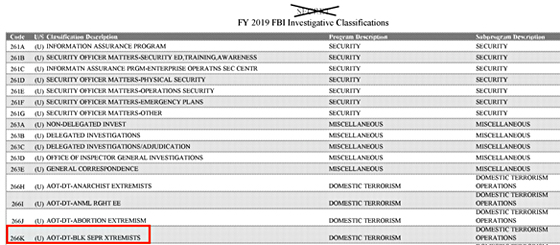It’s been over five years since the Federal Bureau of Investigation’s (FBI) “Black Identity Extremist” (BIE) report was leaked to Foreign Policy magazine in early October 2017. The August 3, 2017, report – which alleged that “perceptions of police brutality against African Americans spurred an increase in premeditated, retaliatory lethal violence against law enforcement” – drew a torrent of criticism from civil rights and civil liberties groups, as well as a backlash from Black House and Senate members. The fact that the FBI was employing overtly race-based criteria for investigating the political activities of Black Americans brought back ugly memories of the Bureau’s infamous Counterintelligence Program (COINTELPRO) targeting the Rev. Martin Luther King, Jr., the Southern Christian Leadership Congress, NAACP, and a host of other prominent Black civil rights leaders and organizations from the mid-1950s through at least the late 1970s.
In the two years after the leak of the “BIE” report, FBI Director Chris Wray found himself constantly on the defensive over the report and the FBI’s use of the BIE term. In late July 2019, Wray told the Senate Judiciary Committee that the Bureau had abandoned the use of the BIE phrase, with one other FBI official claiming the term had not been used by the FBI since 2018.
FBI documents obtained by the Cato Institute via a Freedom of Information Act (FOIA) lawsuit appear to tell a somewhat different story.
The Cato FOIA request in question sought documents about the FBI’s compliance with its own Domestic Investigations and Operations Guide (DIOG), a nearly 700-page manual that serves as the day-to-day guidance for FBI agents and their supervisors as to what kinds of investigative methods and tactics are, or are not, permissible. One document released in the litigation showed a case active as of June 2020 that involved FBI Investigative Classification 266K (see extract below):
That’s significant, because according to a previously classified FBI Investigative Classification guide released to Cato via FOIA, Classification 266K concerns “Black Separatist Extremists” (see extract below):

The acronym “AOT-DT” is shorthand for “Act of Terrorism – Domestic Terrorism” in FBI parlance.
The document containing the June 2020 Classification 266K also has the abbreviation of “FI,” which is short for Full Investigation – the most sweeping kind of FBI investigation in which the full range of investigative tools and techniques can be employed against a target, including wiretaps, covert physical searches, the use of confidential informants, the employment of “otherwise illegal activities,” and “undisclosed participation” in a domestic organization by an FBI employee.
As Cato’s FOIA was dated September 14, 2020, FBI provided no data in the FOIA litigation beyond the date of the request. Thus, whether any additional Classification 266K “Black Separatist Extremists” (which may now be the FBI’s replacement term for “Black Identity Extremists”) assessments or investigations have been opened is not publicly known.
The fact that the FBI’s Investigative Classification system continues to focus, at least in the case of Black Americans, on race-based criteria is clearly at odds with FBI Director Wray’s prior statements to Congress on the matter. Given the ongoing political activities of groups affiliated with the “Black Lives Matter” movement, a renewed Congressional examination of the FBI’s use of the 266K “Black Separatist Extremists” Investigative Classification (and perhaps others) is warranted.
Former CIA analyst and ex-House senior policy advisor Patrick Eddington is a Senior Fellow at the Cato Institute.


